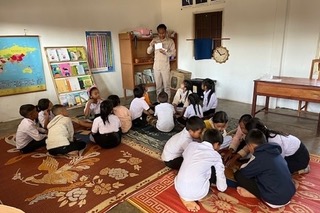 Primary School in Nayang Village, Laos, supported by LuxDevelopment;
Credit: Chronicle.lu
Primary School in Nayang Village, Laos, supported by LuxDevelopment;
Credit: Chronicle.lu
Luxembourg’s Directorate for Development Cooperation and Humanitarian Affairs is responsible for the coordination of the country’s international humanitarian assistance and the implementation of its humanitarian policy (working closely with public and private partners, as well as with international organisations).
The country’s development cooperation policy focuses on the eradication of poverty, especially in the least developed countries and is consistent with its goal of sustainable development. Its interventions take into account the specific social, economic and environmental characteristics of the communities receiving aid and prioritises access to water and sanitation, education, training and professional integration, as well as health and local development. These activities also consider inclusive finance projects. Other priorities of the policy include environment and climate change, as well as the promotion and protection of gender equality and human rights.
The Luxembourg Development Cooperation manages developmental aid in four ways: (a) bilateral cooperation with developing countries, which includes supporting programmes in a number of "project countries"; the majority of bilateral projects are implemented by LuxDev, but other entities are also mandated by the Ministry; (b) multilateral organisations; (c) development NGOs; and (d) Humanitarian and Food action, through financial support or by participating in the funding of specific projects.
The policy targets intervention in three partner countries with which it has signed Indicative Cooperation Programmes (ICPs): Cabo Verde, Senegal and Laos. In late 2024, in a shrinking of the reach of its humanitarian assistance / development aid, Luxembourg's government took the decision not to extend bilateral cooperation with Burkina Faso, Niger and Mali due to political developments in these countries.
Humanitarian / Development Aid part of Luxembourg's Foreign Policy
This aid is an integral part of the Grand Duchy’s foreign policy and plays a key role in the coordination of all activities in the areas of humanitarian action and disaster relief. One of its main aims is to provide immediate emergency aid, including financial aid in cases of conflict, natural disasters, disease outbreaks and other humanitarian crises.
When required, Luxembourg's humanitarian action covers three main areas of intervention: emergency aid, reconstruction support, and prevention. This is always done in accordance with four humanitarian principles of humanity, impartiality, neutrality and independence.
The three main phases of the intervention cycle are:
- emergency relief, intended to meet the basic needs of people in distress;
- the transition stage, aimed at reconstructing impacted communities and private infrastructures and rehabilitating basic services and means of subsistence;
- resilience and prevention: strengthening the socio-economic capabilities of communities at risk of a crisis or disaster, in order to take measures to prevent and prepare for such emergencies.
Luxembourg's four fundamental humanitarian principles are:
- humanity, the main aim of which is to save lives and alleviate suffering wherever it may be;
- impartiality: not discriminating between or among affected populations;
- neutrality, meaning that where aid is implemented, humanitarian aid cannot take either side in a conflicts or confrontation situation;
- independence, which refers to the independence of humanitarian aid objectives from political, economic, military or other agendas in areas where it is implemented.
Percentage of State Budget
Since 2009, Luxembourg has invested almost 1% of its gross national income (GNI) into development aid, also known as official development assistance (ODA), on an annual basis. This places the country among the top five contributors globally. The OECD’s Development Assistance Committee (DAC) defines official development assistance as “government aid that promotes and specifically targets the economic development and welfare of developing countries”. Provisional figures for 2024 indicate that Luxembourg’s ODA amounted to €551 million, of which 28% was allocated within the framework of multilateral aid and 72% as part of bilateral aid. In 2024, more than 300 million people worldwide required humanitarian aid and the number of people forcibly displaced is reported to have reached a record level of more than 122 million.
In his recent State of the Nation address, Luxembourg’s Prime Minister, Luc Frieden, did not directly address the overseas aid budget allocation of 1% of GNI when discussing total spending. The government has, however, pledged to spend double this amount on defence, by targeting a spend of 2% of GNI on security and defence by the end of 2025.
The Luxembourg government has previously stated that it remains committed to its contribution of 1% of GNI to ODA. This is in contrast to other developed and rich nations that have cut their humanitarian budgets, including Germany, France, Belgium and the United Kingdom. In January 2025, the United States’ Trump administration gave an executive order freezing all foreign aid, subject to a 90-day review (this review deadline has been extended by 30 days). The decision by these countries to withdraw contributions has had a devastating impact on many humanitarian and development programmes in developing and vulnerable regions, most especially in areas previously funded by the United States Agency for International Development (USAID). The US had been the largest contributor of overseas financial aid, equivalent to around $63 billion in 2023. USAID also contracted and funded aid agencies from other countries to implement humanitarian aid programmes worldwide. These agencies, including some with entities in Luxembourg, are also directly impacted by the funding cuts. As a result, countless people worldwide are now unable to access the support on which they rely, which, as reported by many aid agencies affected, can be the difference between life and death.
Luxembourg’s Deputy Prime Minister and Minister for Development Cooperation and Humanitarian Affairs, Xavier Bettel, has emphasised that development cooperation is a central pillar of Luxembourg’s foreign policy. He has also acknowledged the important work carried out by non-governmental developmental organisations (NGDOs), who work at a local level and are often present in countries where Luxembourg does not have diplomatic representation.
NGDOs in Luxembourg
Four of the main NGDOs in Luxembourg are Handicap International, Red Cross, Médecins Sans Frontières and UNICEF.
Martin Lagneau, Director of Handicap International (HI) in Luxembourg, described the direct consequences cuts in international aid are having on HI projects, particularly in Ukraine, Syria, Gaza and Haiti: “Hundreds of thousands of people are now at risk of no longer benefiting from our aid. Their lives are at stake. This means that children with disabilities will no longer be able to go to school. Tens of thousands of people will continue to live under the threat of explosive devices left over from the fighting because we have had to stop or suspend our demining activities in Syria or Colombia. Children will no longer be able to go to school in complete safety and farmers will no longer be able to cultivate their fields”. HI stressed that the number of victims and health challenges in Ukraine, Gaza, Sudan and the Democratic Republic of Congo are increasing due to current crises.
The Luxembourg Red Cross explained to Chronicle.lu that it obtains funding “not through the US Agency for International Development (USAID), which has been hit hard by US President Donald Trump’s cost-cutting measures, but through other donors, like the European Union, the Ministry for Foreign Affairs, LuxDev, as well as other aid organisations and private donors. Hence, we have not been impacted by the USAID cuts”.
Médecins Sans Frontières (MSF - Doctors without Borders) in Luxembourg also reported that it does not accept funding from the US government and is “therefore not directly affected by these drastic changes, unlike the majority of humanitarian organisations. However, we work closely with other health and aid organisations to provide life-saving services, and many of our activities are part of programmes now disrupted by these budget cuts. As a result, the people and communities we support are feeling the consequences deeply”.
Speaking of the funding cuts, UNICEF Executive Director Catherine Russell said: “Announced and anticipated funding cuts will limit UNICEF’s ability to reach millions of children in dire need. These cuts, by numerous donor countries, follow two years of aid reductions at a time of unprecedented need. Millions of children are affected by conflict, need to be vaccinated against deadly diseases such as measles and polio, and must be educated and kept healthy.” According to UNICEF, global aid cuts are fuelling a child emergency crisis.
Caritas was another organisation active in such work: however, in 2024, Caritas Luxembourg suspended its international projects in developing countries. Prior to this, Caritas Luxembourg was closely involved in providing aid in the cases of natural disasters, conflicts and other humanitarian emergencies worldwide. The organisation Hëllef um Terrain now manages the former Caritas Luxembourg national projects only.
Going Forward
Aid agencies worldwide are reliant on government funding to respond quickly when a crisis or disaster occurs. However, long-term projects aimed at improving education, healthcare and food production, among others, are also of significant importance and necessity for developing countries to foster resilience and stability. According to UNICEF: “global aid is not just about helping others - it benefits all of us. Vaccinations stop diseases crossing borders. When families have food and security they don’t flee their homes in desperation. When children get an education they grow up to build stable economies. Aid is a smart investment that makes up less than 1% of national budgets”.
Humanitarian aid programmes have saved millions of lives globally but are dependent on continued funding and support, such as is given by Luxembourg and other developed nations. The recent decision by some richer nations to reduce or cut such funding will have global implications both in the short and long-term. There is an urgent need for these countries to reconsider the removal of decades of financial support that offered a lifeline to the developing world. The profound negative impact of their decisions on the vulnerable populations of the world cannot be overstressed. Effective foreign aid should be restored and maintained to ensure the well-being of all people worldwide.









